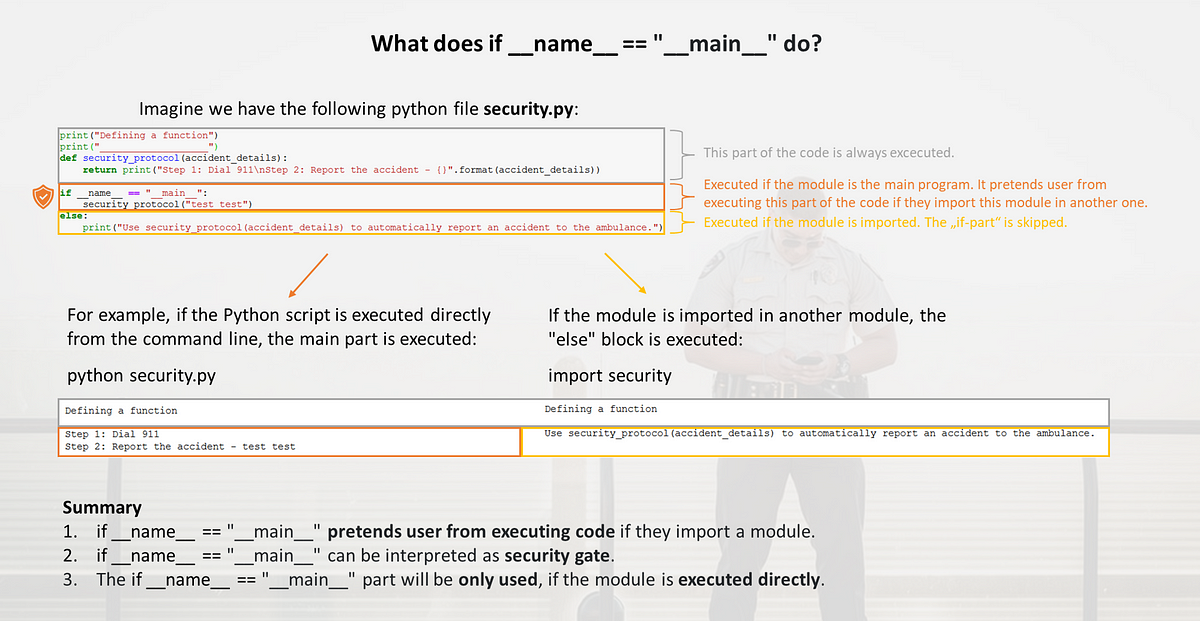Python __name__ == "__main__": Explained
Learn how if __name__ == "__main__": elegantly controls code execution in Python scripts and modules, enhancing code organization and reusability.
Learn how if __name__ == "__main__": elegantly controls code execution in Python scripts and modules, enhancing code organization and reusability.
In Python, the name variable helps us understand if a Python file is being run directly or being imported as a module. Let's explore how this works and why it's a valuable tool for writing cleaner and more organized code.
In Python, every module (a file containing Python code) has a built-in variable called __name__. This variable helps determine how the script is being run.
When you run a Python script directly, the __name__ variable of that script is automatically set to "__main__".
However, if you import a script as a module into another script, the __name__ variable of the imported script will be set to its actual module name (the filename without the .py extension).
Now, let's talk about the if __name__ == "__main__": block. This block of code will only execute if the script is run directly. If the script is imported as a module into another script, the code within this block will not run.
Here's why this is useful:
Organizing your code: It allows you to separate the code that you want to run directly from the code that defines functions, classes, or other reusable components. This makes your code more organized and easier to maintain.
Preventing unintended execution: When you import a module, you might not want all of its code to execute immediately. The if __name__ == "__main__": block prevents this by only running the code within it when the script is run directly.
Creating reusable modules: By placing your reusable code outside the if __name__ == "__main__": block, you make it available for other scripts to import and use without triggering the main execution logic of your module.
In simpler terms, the if __name__ == "__main__": block acts like a gatekeeper, allowing you to control which parts of your code run when the script is executed directly and which parts are only available when imported as a module.
This Python code defines two functions: greet which prints a greeting message with a given name, and add which returns the sum of two input numbers. It also includes a conditional block that executes only when the script is run directly, demonstrating the functions by taking user input and displaying results. This structure allows the code to be both runnable independently and importable as a module in other Python scripts.
# my_module.py
def greet(name):
"""Greets the person passed in as a parameter."""
print(f"Hello, {name}!")
def add(x, y):
"""Adds two numbers and returns the result."""
return x + y
# This code block will only execute when my_module.py is run directly
if __name__ == "__main__":
print("Running my_module.py directly...")
user_name = input("Enter your name: ")
greet(user_name)
num1 = float(input("Enter the first number: "))
num2 = float(input("Enter the second number: "))
result = add(num1, num2)
print(f"The sum of {num1} and {num2} is {result}")Explanation:
Defining functions: The code defines two functions, greet and add, which are intended to be reusable components.
The if __name__ == "__main__": block:
my_module.py is executed as the main program.How to run and import:
Running directly: Save the code as my_module.py and run it from your terminal using python my_module.py. You'll be prompted for input, and the output will be displayed.
Importing as a module: Create another Python file (e.g., main.py) in the same directory and import the module:
# main.py
import my_module
my_module.greet("Alice") # Call the greet function from my_module
sum_result = my_module.add(5, 3) # Call the add function
print(f"Sum from main.py: {sum_result}")When you run main.py, you'll notice that:
greet and add are available for use.if __name__ == "__main__": block in my_module.py does not execute automatically.This demonstrates how the if __name__ == "__main__": block helps organize code, prevent unintended execution, and create reusable modules in Python.
Technical Explanation: The __name__ variable is set by the Python interpreter at runtime. When a script is run directly, its __name__ is set to "__main__". When a script is imported as a module, its __name__ is set to the module's name (the filename without the .py extension).
Analogy: Think of a play. The if __name__ == "__main__": block is like the stage directions that only the actors follow during a performance. The rest of the code, defining functions and classes, is like the script itself, which can be read and understood without being performed.
Best Practices:
if __name__ == "__main__": block should ideally be concise and focused on high-level program execution.main() function: For larger programs, it's common to define a main() function within the if __name__ == "__main__": block to further structure the code.Alternatives: While the if __name__ == "__main__": block is the standard way to achieve this behavior, some programmers might use alternative approaches like entry points defined in setup.py for more complex project structures. However, for most common use cases, the if __name__ == "__main__": block remains the most straightforward and widely accepted solution.
| Feature | Description | Use Cases |
|---|---|---|
__name__ variable |
A built-in variable in every Python module (.py file). |
Determines how the script is being run (directly or imported). |
__name__ value when script run directly |
"__main__" |
|
__name__ value when script imported as module |
Module's name (filename without .py) |
|
if __name__ == "__main__": block |
Code within this block executes only when the script is run directly. | 1. Code organization: Separates executable code from reusable components (functions, classes). 2. Prevents unintended execution: Imported modules don't run their entire codebase. 3. Creates reusable modules: Makes code available for import without triggering main execution logic. |
In essence: The if __name__ == "__main__": block acts as a gatekeeper, controlling which parts of your code run depending on how the script is used (directly executed or imported).
In conclusion, Python's __name__ variable and the if __name__ == "__main__": block provide a powerful mechanism for controlling code execution based on whether a script is run directly or imported as a module. This feature is crucial for writing well-organized, reusable, and maintainable Python code. By understanding and utilizing this concept effectively, you can enhance the structure and functionality of your Python projects.
 What does the Python 'if name equals main' construct do ... | For programmers who are not familiar with double-unders, Python's if name == 'main': construct can be intimidating. Here we explain what it means.
What does the Python 'if name equals main' construct do ... | For programmers who are not familiar with double-unders, Python's if name == 'main': construct can be intimidating. Here we explain what it means. What Does if name == "main" Do in Python? – Real Python | In this tutorial, you'll learn all about Python's name-main idiom. You'll learn what it does in Python, how it works, when to use it, when to avoid it, and how to refer to it.
What Does if name == "main" Do in Python? – Real Python | In this tutorial, you'll learn all about Python's name-main idiom. You'll learn what it does in Python, how it works, when to use it, when to avoid it, and how to refer to it. Why do I have to write -> "If name == "__main": print ... | Armaan Gill is having issues with: Hello, why when using dunder main do we have to write "if name == "main": print(".///') like when will I have to use that func...
Why do I have to write -> "If name == "__main": print ... | Armaan Gill is having issues with: Hello, why when using dunder main do we have to write "if name == "main": print(".///') like when will I have to use that func... What does the if name == “main”: do? - GeeksforGeeks | A Computer Science portal for geeks. It contains well written, well thought and well explained computer science and programming articles, quizzes and practice/competitive programming/company interview Questions.
What does the if name == “main”: do? - GeeksforGeeks | A Computer Science portal for geeks. It contains well written, well thought and well explained computer science and programming articles, quizzes and practice/competitive programming/company interview Questions. What does if name == “main” do in 2 minutes - Medium | A short explanation of a widely used concept
What does if name == “main” do in 2 minutes - Medium | A short explanation of a widely used concept Do you recommend using top level code or if name == '__main ... | Wondering if there is a reason to prefer this: if name == 'main': sys.exit(main()) over just starting from line one and executing code. If starting from line one, should you mix other functions into your main script? Why do you prefer it?
Do you recommend using top level code or if name == '__main ... | Wondering if there is a reason to prefer this: if name == 'main': sys.exit(main()) over just starting from line one and executing code. If starting from line one, should you mix other functions into your main script? Why do you prefer it?